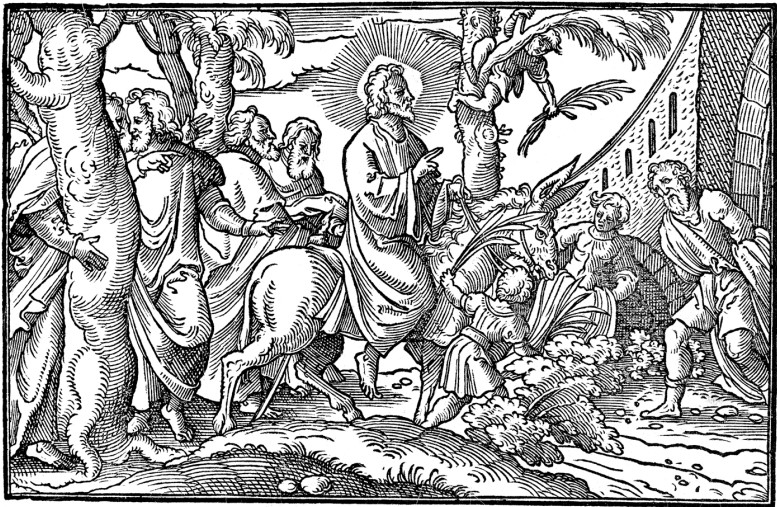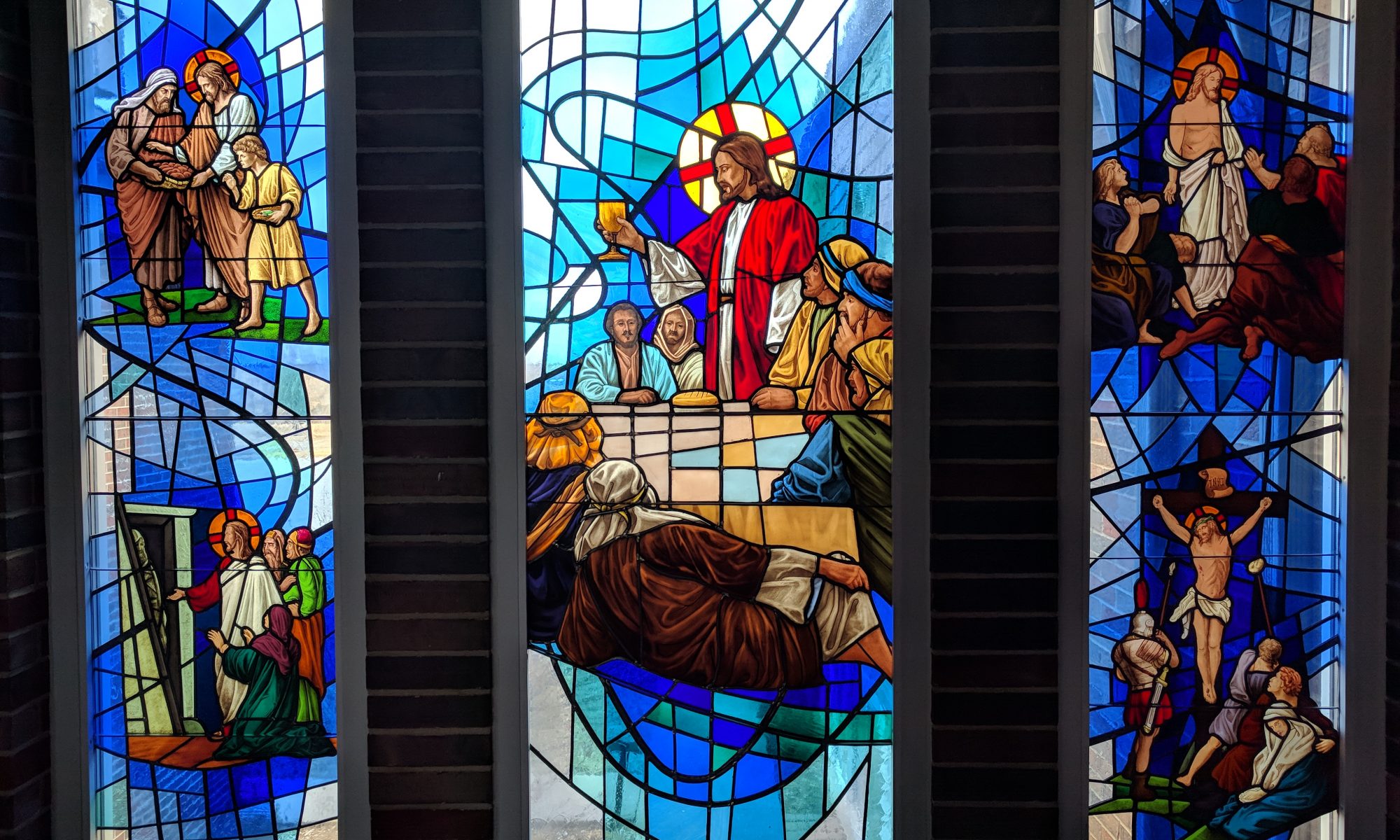
Grace, mercy, and peace to you from God our Father and our Lord and Savior, Jesus Christ. Amen.
Our Epistle lesson states, “God has highly exalted him and bestowed on him the name that is above every name, so that at the name of Jesus every knee should bow, in heaven and on earth and under the earth, and every tongue confess that Jesus Christ is Lord, to the glory of God the Father” (Phil 2:9-11). Yes, it is written that, at the name of Jesus, every knee should bow—both in Heaven and on Earth.
Why bow at His name? Because God has exalted Him and bestowed on Him the name that is above every name. He is, after all, the King of kings and Lord of lords. He is our Prophet, Priest, and King. Jesus atoned for the sin of the world through the sacrifice of His body on the cross, He proved Satan has no power over Him as He proclaimed His victory when He descended into Hell, and He swallowed up death through His triumphant resurrection.
Dear fellow redeemed, you are welcome to bow when Jesus’ name is spoken or sung in the Divine Service. He is named at the Invocation, where you may bow slightly and make the sign of the cross. He is named during Confession and Absolution, and we sing His name in the Gloria in Excelsis. I am not suggesting that you bow every time you hear His name spoken in sermons or Scripture readings. You may.
Why bow? Are we worshipping a name or a person? A question like that sets up a false dichotomy. We are worshipping Jesus, who saves us. In fact, that’s what His name means. Two good ways to translate the name Jesus is “The Lord is salvation” or “The Lord saves.” The angel of the Lord instructed Joseph, “You shall call his name Jesus, for He will save His people from their sins” (Matt. 1:21). It’s worth noting that this name was not uncommon in Old Testament times. The most famous example is Joshua the son of Nun, who led God’s people across the Jordan River and into the Promised Land after their 40-year journey in the wilderness. You see, the name Joshua comes from the Hebrew for “The Lord is salvation” and name Jesus comes from the Greek. Both names have the same meaning. The name Jesus for the Christ is fitting; He is our Savior.
But was Joshua our savior? Technically, no. Yet his name is fitting, for he was God’s instrument to bring God’s people into the Promised Land. In the same way, Jesus was sent by the Father to make it possible for us to be brought into the Promised Land of Heaven. Joshua prefigured Jesus in bringing God’s people to a place flowing with milk and honey—a permanent home—a land of rest.
I am going to say more about name Jesus or Joshua—by way of Psalm 118. I encourage you to find this psalm in the front of your hymnals, because Psalm 118 speaks significantly of the Palm Sunday, Holy Week, and Easter events. I will be reading from the NKJV, and the hymnals are printed in the ESV.
Concerning this psalm, Dr. Martin Luther wrote, “This is my own beloved psalm. Although the entire Psalter and all of Holy Scripture are dear to me as my only comfort and source of life, I fell in love with this psalm especially. Therefore I call it my own. When emperors and kings, the wise and the learned, and even saints could not aid me, this psalm proved a friend and helped me out of many great troubles. As a result, it is dearer to me than all the wealth, honor, and power of the pope, the Turk, and the emperor. I would be most unwilling to trade this psalm for all of it” (AE 14:45).
In Psalm 118:14, the word Joshua comes up, but not as a person’s name. Instead, the Psalm declares, “The LORD is my strength and song, And He has become my salvation.” The word salvation is the Hebrew word לִֽישׁוּעָֽה (lî-šū-‘āh). Combine that with יָ֑הּ (YAH) for LORD, and you have Yashuah, or Joshua (“the LORD is salvation”). When we pray Psalm 118, we are confessing that Jesus has become our salvation.
He does so through our Lord’s Passion and victory over death, which is prophesied in Psalm 118:22, “The stone which the builders rejected Has become the chief cornerstone.” Jesus was rejected by the Jewish leadership, but the risen Christ is now the pillar and foundation of the Church. On Christ the solid rock, we stand.
Later in the same psalm, we pray these words, “Save now, I pray, O LORD; O LORD, I pray, send now prosperity. Blessed is he who comes in the name of the LORD! (Psalm 118:25-26 NKJV). I know you recognize that last line (“Blessed is he who comes in the name of the Lord”). We sing those words in the Sanctus as we prepare to receive the Sacrament. The crowds on Palm Sunday were joyfully shouting these words as Jesus rode into Jerusalem on a donkey.
In fact, Psalm 118:19-20 prophesies the triumphal entry of Jesus as He passes through the gates into Jerusalem, along with the crowds proclaiming their praises. These verses declare, “Open to me the gates of righteousness; I will go through them, And I will praise the LORD. This is the gate of the LORD, through which the righteous shall enter.”
But what about that strange word, Hosanna, that we sing every Sunday in the Sanctus, and hear every year on Palm Sunday? What does it mean and where does it come from? If we consider again Psalm 118:25-26, we pray, “Save now, I pray, O LORD… Blessed is he who comes in the name of the LORD!” The words save now are in Hebrew, הֹושִׁ֘יעָ֥ה נָּ֑א (hō-wō-šî-‘āh nā), which has been abbreviated to hosanna. Hosanna means “Save now.” To exclaim “Hosanna to the Son of David” is to pray, “Save now” to the Son of David. Jesus is the Son of David. So as the crowds sang those words, they were saying that Jesus is the One who was prophesied in Psalm 118—the bringer of salvation. Psalm 118 was one of the most familiar psalms to the Jews of the Old Testament era. Their joy on Palm Sunday is that Jesus has come.
I’d like to add one last thing to your Hebrew lesson for today. Remember the name Joshua means “The Lord is salvation.” And Hosanna means “Save now.” They have the same root. Joshua is based on the noun for salvation. Hosanna is imperative verb for save now. By proclaiming Hosanna to Jesus on Palm Sunday, the crowds were saying Jesus is the one and only Savior of mankind. They were praying for salvation through this Man who is riding on a colt, the foal of a donkey. And so, they laid their cloaks before Him and laid palm branches down as His royal carpet to enter the holy city as their King. They recognized Him as the Lord of life, for He had raised Lazarus from the dead. They were filled with joy as they saw in Jesus the fulfillment of all that was said of the coming Messiah.
No wonder, then, the Pharisees were upset. They rejected Jesus as the Savior of the Nations—the Coming One—the Messiah. We heard John’s report, “The crowd that had been with him when he called Lazarus out of the tomb and raised him from the dead continued to bear witness. The reason why the crowd went to meet him was that they heard he had done this sign. So the Pharisees said to one another, ‘You see that you are gaining nothing. Look, the world has gone after him’” (John 12:17-19). The Pharisees didn’t realize that they are the “builders” who rejected Him as prophesied in Psalm 118:22. Right before our reading from John 12:12-19 began, St. John also reported, “When the large crowd of the Jews learned that Jesus was there, they came, not only on account of him but also to see Lazarus, whom he had raised from the dead. So the chief priests made plans to put Lazarus to death as well, because on account of him many of the Jews were going away and believing in Jesus” (John 12:9-11). Already, the chief priests had plotted to kill Jesus (John 11:45-57). In fact, Caiaphas, the High Priest, “prophesied that Jesus would die for the nation, and not for the nation only, but also to gather into one the children of God who are scattered abroad” (John 11:51-52).
By riding on the donkey into Jerusalem—by riding on to die—Jesus did just that. He atoned for the sins of the world. He then gathers His people together as His bride, the Church. He has called His people from all peoples, tongues, nations, and tribes. His Word has gone forth throughout the Earth, so that many—whether Jew or Gentile—now call upon the name of Christ, calling on Him to save.
The Church has wisely preserved the Palm Sunday song in her Communion liturgy. These are not boring, repetitive words. We join in song with Christians across the globe and throughout the centuries. We are singing a portion of a psalm that has been considered among the chief of psalms, written about 3,000 years ago.
When we prepare to receive the Sacrament, we sing in our own language “Blessed is He who comes in the Name of the Lord.” Then suddenly all people of all languages all sing the same word no matter what language they are singing in. Hosanna! Hosanna! Hosanna in the highest!
Oh what blessing it is that God has placed these words in our lips, that we may proclaim His praise! What privilege we have, as God’s very children, to sing of the salvation earned by our Savior, Jesus, who died for us on the cross! So sing these heavenly words with great joy, knowing that Christ raised Lazarus from the dead, Jesus Himself rose from the grave, and you, too, shall rise and live before God in righteousness and purity forever.
No wonder we are invited to bow at the name of Jesus. No wonder His name is exalted above every name. Jesus is Lord. He is your Savior, who died to take away your sins and rose from the grave to give you eternal life. Amen.
The peace of God which passes all understanding keep your hearts and minds in Christ Jesus to life everlasting. Amen

